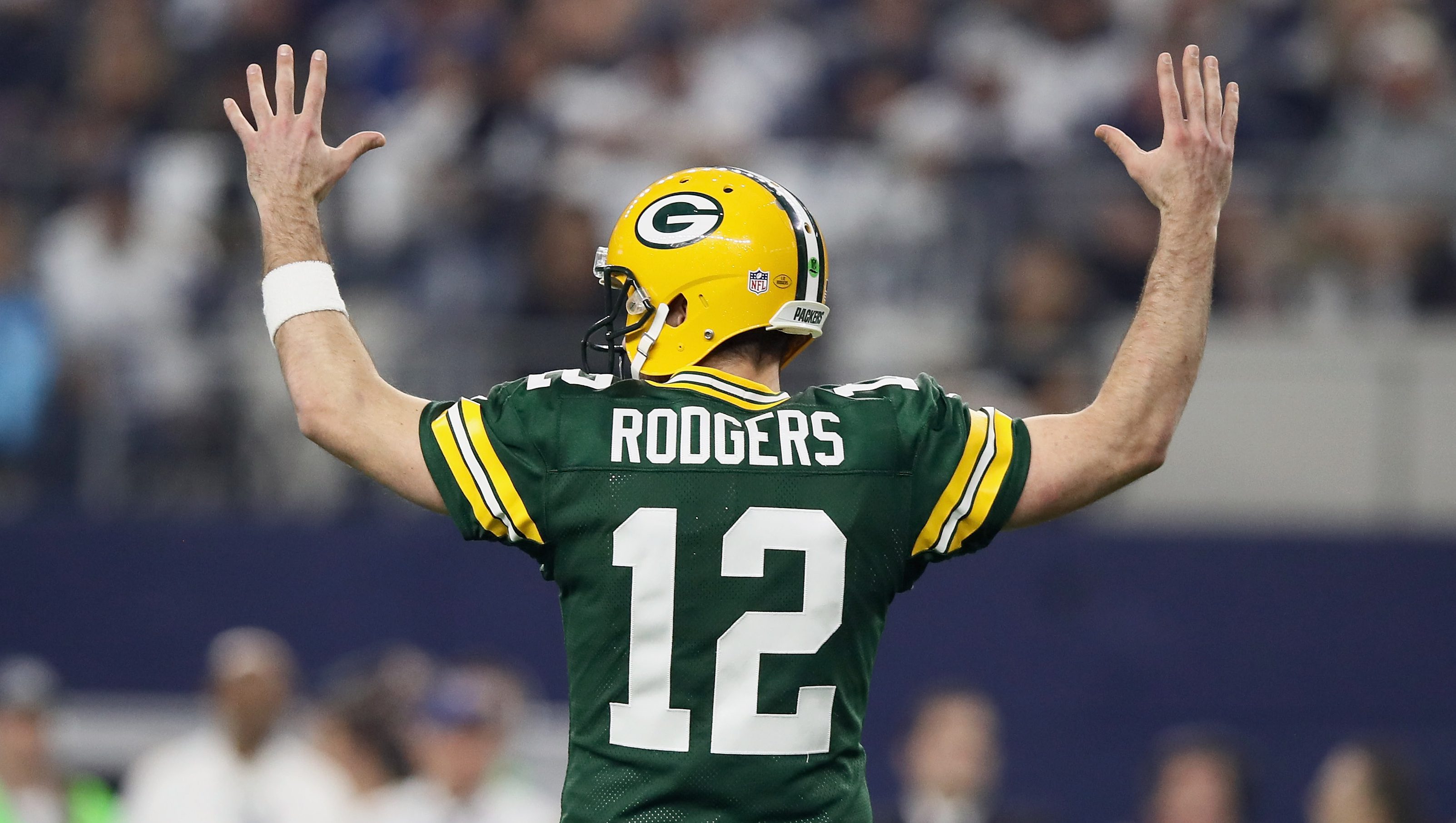Aaron Rodgers Super Bowl Wins: The Full Breakdown
How many Super Bowls does Aaron Rodgers truly have to his name, and why does that single championship ring feel like such a complex answer to a seemingly simple question? For a quarterback of his caliber, the disparity between individual brilliance and team success is a narrative thread that has followed Aaron Rodgers throughout his illustrious career.
The Green Bay Packers legend, celebrated for his unparalleled arm talent, football intelligence, and clutch performances, has etched his name into the annals of the sport. Yet, the conversation around his legacy inevitably circles back to the ultimate prize: Super Bowl rings. His single triumph, Super Bowl XLV, earned in 2011 against the Pittsburgh Steelers, often serves as both a testament to his greatness and a lingering point of contention in debates about his place among the all-time greats.
| Attribute | Details |
|---|---|
| Full Name | Aaron Charles Rodgers |
| Date of Birth | December 2, 1983 |
| Place of Birth | Chico, California, USA |
| Height | 6 ft 2 in (1.88 m) |
| Weight | 225 lb (102 kg) |
| High School | Pleasant Valley High School (Chico, CA) |
| College | Butte College (2002), University of California, Berkeley (2003-2004) |
| NFL Draft | 2005, Round 1, Pick 24 (Green Bay Packers) |
| NFL Teams | Green Bay Packers (2005-2022), New York Jets (2023-Present) |
| Position | Quarterback |
| Jersey Number | 12 (Green Bay Packers), 8 (New York Jets) |
| Super Bowl Appearances | 1 (Super Bowl XLV) |
| Super Bowl Wins | 1 (Super Bowl XLV) |
| Major Achievements | Super Bowl XLV Champion & MVP, 4x NFL MVP, 10x Pro Bowl, 3x All-Pro |
| Notable Stats | All-time leader in career passer rating (103.6), 475 career passing touchdowns |
| Reference | NFL.com Player Profile |
The narrative of Aaron Rodgers' career is intricately woven with threads of individual excellence. His statistics are staggering. He holds the all-time record for career passer rating (103.6), a testament to his remarkable efficiency and decision-making. His arm is legendary, capable of making throws that few quarterbacks in history could even dream of attempting. His ability to extend plays, to evade pressure, and to find receivers downfield is unmatched. He has been selected to the Pro Bowl ten times and has been named All-Pro three times. The four NFL MVP awards adorning his mantle are a clear indication of the respect and admiration he commands from his peers and the league as a whole.
Yet, the harsh reality of the Super Bowl count casts a shadow. In the high-stakes world of professional football, individual accolades, while significant, often take a backseat to team success. Super Bowl championships serve as the ultimate measuring stick, the defining moment that cements a player's legacy. For Rodgers, the single Super Bowl win, while a glorious achievement, creates a contrast that fuels the ongoing debate. It's a discussion that pits the undeniable brilliance of Rodgers against the frustrating reality of playoff shortcomings.
The Packers teams that Rodgers led throughout the majority of his career were consistently competitive. They were perennial playoff contenders, often finishing with impressive regular season records. However, these teams frequently fell short when it mattered most. They were eliminated in the Divisional Round multiple times, and other playoff losses have punctuated his career.
The context surrounding Super Bowl XLV is also crucial. It was a hard-fought victory against a formidable Steelers team. Rodgers delivered a masterful performance, earning the Super Bowl MVP award. The Packers were the underdogs going into the game, and their triumph was a testament to their resilience and Rodgers' leadership. That victory alone, however, does not fully capture the arc of his career.
Several factors contributed to the Packers' playoff disappointments. The NFL is a parity-driven league, and the NFC, during Rodgers' prime, was exceptionally competitive. The Seattle Seahawks, San Francisco 49ers, and New Orleans Saints all presented formidable challenges. The Packers often faced these teams in the playoffs, leading to some heartbreaking defeats. Injuries to key players, strategic decisions, and sometimes, simply bad luck, also played a role in the Packers' playoff struggles. The team's defensive performances, in particular, often came under scrutiny during crucial moments in the postseason.
Despite the lack of multiple Super Bowl rings, the narrative of Aaron Rodgers extends far beyond the hardware. His impact on the game is undeniable. He has revolutionized the quarterback position, demonstrating an unparalleled ability to make plays under pressure. He is a master of the pre-snap read, consistently identifying defensive weaknesses and making the necessary adjustments at the line of scrimmage. His command of the offense, his ability to throw the ball with pinpoint accuracy, and his remarkable field awareness have made him one of the most exciting and effective quarterbacks of all time.
Furthermore, Rodgers' influence extends beyond the field. He is a respected leader and a mentor to younger players. His work ethic and dedication to the game have served as an inspiration to his teammates and to aspiring quarterbacks around the world. He has become a symbol of excellence in the NFL, and his impact on the Packers organization will be felt for years to come.
The 2023 season saw Rodgers embarking on a new chapter in his career, joining the New York Jets. The move represented a fresh start, a new opportunity to chase a second Super Bowl ring and to further solidify his legacy. While the Jets' season was unfortunately cut short due to an injury to Rodgers, the move itself indicated his enduring desire to compete at the highest level.
The discussion of Aaron Rodgers and Super Bowls is a reminder of the complex equation of professional sports. It highlights the delicate balance between individual achievement and team success. It is a debate that will continue to evolve as Rodgers career unfolds. He remains one of the most captivating players in the history of the game. Whether he adds more Super Bowl rings to his collection is secondary to the fact that he has left an indelible mark on the sport.
The enduring question isn't simply "how many Super Bowls?" It's how we, as fans, choose to define greatness. Do we measure it solely by championships? Or do we also consider the artistry, the skill, the impact, and the sheer entertainment that Aaron Rodgers has brought to the game? The answer, of course, is multifaceted and often comes down to personal perspective. But one thing is certain: Aaron Rodgers, regardless of his Super Bowl count, will be remembered as one of the most extraordinary quarterbacks to ever grace a football field. His legacy is not solely defined by rings, but by the unforgettable moments, the breathtaking throws, and the unwavering excellence he has consistently demonstrated throughout his career.
The Super Bowl, in many ways, represents the pinnacle of the sport, a moment in time where the culmination of a season's hard work is on display. The scarcity of Super Bowl appearances for a player of Rodgers' caliber fuels the discussion about the 'what ifs' and the potential legacies that might have been, especially when comparing him to some of his peers who have amassed multiple rings. Tom Brady, for instance, is often cited as the benchmark for quarterback success, with his seven Super Bowl victories. The comparison, while sometimes unavoidable, highlights the contrasting paths that can lead to greatness.
Football is, by its very nature, a team sport. The contributions of the offensive line, the running game, the defense, and the coaching staff are all vital. No single player, no matter how talented, can guarantee a Super Bowl victory. Rodgers' career serves as a testament to this, showcasing how a quarterback's brilliance can be offset by the performance of the team surrounding him. The constant evolution of the NFL, the rise of new contenders, and the sheer randomness inherent in single-elimination playoff formats also play significant roles in determining who hoists the Lombardi Trophy.
The narrative surrounding Rodgers' career is also shaped by the evolving expectations of fans and media. In an age of relentless digital scrutiny, every play, every decision, and every outcome is dissected and analyzed. The pressure to win, to achieve the ultimate goal of a Super Bowl, has never been greater. This pressure, while understandable, can sometimes overshadow the broader picture of a player's contributions and impact.
The discussion of Rodgers and Super Bowls is also intertwined with discussions of "legacy." How will he be remembered? What is his lasting impact on the game? His playing style, his longevity, and his individual achievements all contribute to this evolving narrative. The fact that this conversation continues, years after his Super Bowl victory, speaks to his enduring importance.
Rodgers' future also remains a factor. As he navigates his new chapter with the New York Jets, the possibility of adding another Super Bowl win remains a significant subplot in his already storied career. His journey provides a fascinating lens through which to examine the pressures, the complexities, and the enduring allure of professional sports. His story is an ongoing one, a testament to the fact that in football, as in life, the only constant is change.
The final judgment on Aaron Rodgers' career, and his place among the all-time greats, will likely remain a topic of debate. But while the number of Super Bowl rings might be a key data point, it is not the definitive factor. The impact of his career goes far beyond that, and his place in football history is already secure. Its a story of incredible talent, of thrilling moments, and a continued pursuit of excellence.



